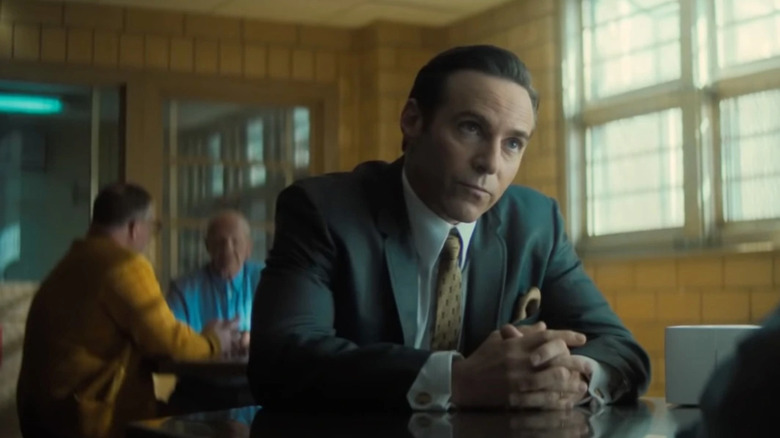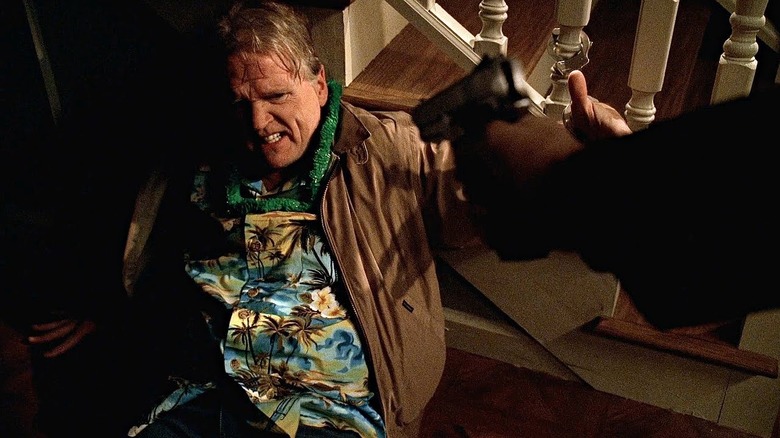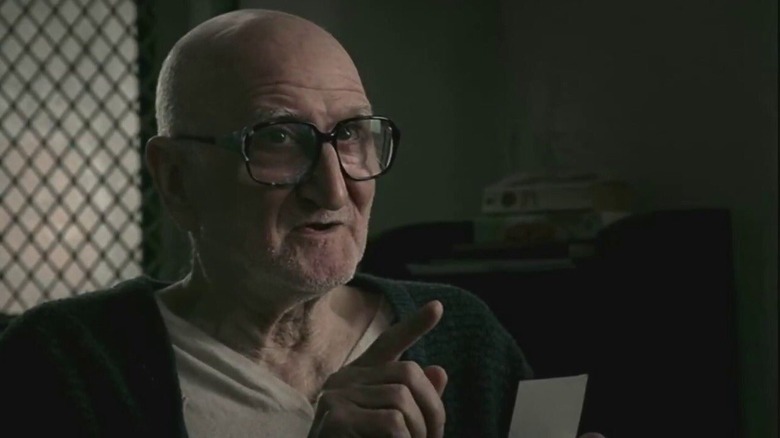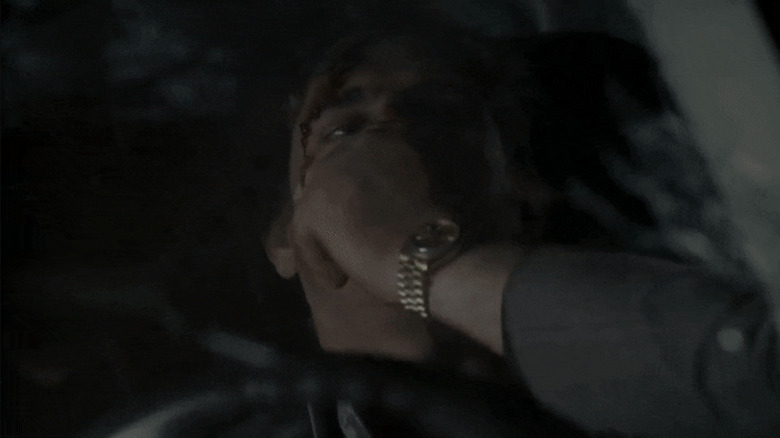Dickie Moltisanti's Death Might Be The Sopranos' Darkest Storyline
"It's all a big nothing." Those words from Livia Soprano (Nancy Marchand) in the episode "D-Girl" define her character and the ethos of "The Sopranos." Even for a show about violent mobsters, it's strikingly cynical about human nature and people's ability to change. By the end of the show, almost everyone has either remained static or gotten worse ... the ones who made it out alive that is.
The prequel film "The Many Saints of Newark" shows how the wheels of these bleak outcomes were set in motion long ago. Tony (played by Michael Gandolfini, son of his original actor James) and Livia (now Vera Farmiga) have chances to change for the better but don't take them. The darkest storyline of all is about Dickie Moltisanti (Alessandro Nivola), Tony's mentor and the father of Christopher (Michael Imperioli). "Many Saints" reveals how Dickie's own failures to put his surrogate son on the right path brought ruination to his own.
Dickie in The Sopranos
During "The Sopranos," Dickie is long dead — "Many Saints" reveals he died in 1973. He's infrequently mentioned, first in "Big Girls Don't Cry" when Christopher takes an acting class and his daddy issues flare up, but Dickie never appears in flashbacks. The closest thing is a photo of him with a young Christopher.
The most important role Dickie plays is in the season 4 premiere, "For All Debts Public and Private." Tony tells Christopher that Dickie was killed by a freshly-retired police detective named Barry Haydu. According to Tony, Haydu was on the payroll of Jilly Ruffalo, whose cellmate had been killed by Dickie. Christopher states that Dickie was carrying a crib for him when he was shot, but Tony reveals it was actually TV trays. Tony then gives Christopher permission to kill Haydu, following the detective home and killing him after a brief home invasion.
The episode doesn't answer if Tony was telling the truth about Haydu, though. The man himself denies it at first, but his last words are "I'm sorry" to Chris. Is he finally conceding the truth or just desperate? Chris himself acknowledges that Tony might be lying, but he doesn't care because his "uncle" still wants Haydu dead.
The truth isn't what's really important about the episode, though. Dickie's purpose is to provide context for Tony and Christopher's relationship. Tony's affection for Christopher stems from his fond memories of "Uncle Dick." Dickie is also said to have been an addict; Christopher inherits this struggle and by the end of the series is disillusioned with his father because of it. In the end, Tony's affection for Dickie isn't enough to stop him from strangling Christopher, either.
Many Saints reveals
Before "Many Saints" was released, Rolling Stone asked "Sopranos" creator David Chase about the lingering mysteries of "From All Debts Public and Private." Chase cryptically answered, "Did I believe Tony was being completely honest about every aspect? That would be unusual." Sure enough, the film answers some questions but doesn't provide the whole picture.
For starters, the gunman who killed Dickie is unidentified and there's never a clear shot of his face. The mystery about Barry Haydu remains alive and well. However, the film does reveal who ordered the murder: of all people, it was Uncle Junior (Dominic Chianese in the series, Corey Stoll in the film). Junior, aka Corrado Soprano, felt emasculated by Dickie's rising star in the New Jersey mob. When Dickie laughed at Junior for tripping in the rain, that was that. How much of the truth Tony knows is unclear.
This can seem like a left-field answer; in "The Sopranos," Junior never talked about Dickie and he didn't have much of a relationship with Christopher. However, the revelation informs Junior's character in a way consistent with his "Sopranos" depiction. Junior is a petty man; Hesh (Jerry Adler) says of him, "the man is driven in total by his insecurities." Indeed, during season 1 Junior, egged on by Livia, tries to have Tony killed to secure his place as the DiMeo family boss.
In the end, Junior winds up dementia-ridden and abandoned. The penultimate scene of the finale, "Made in America," sees Tony visit Junior. By that point, his uncle has lost all memory, only recognizing Tony as someone he once played catch with. In the end, Junior's crimes and power grabs all added up to nothing but loneliness, which Tony understands as he walks away from his uncle.
Dickie's depressing legacy
Dickie's death comes at a most inopportune time and only leaves him a legacy of failure. He spends most of the movie trapped in the same cycle as Tony during "The Sopranos" — aspiring to be a better person and utterly failing at it.
Dickie hates his father Aldo (Ray Liotta) for beating his mother. Early in the film, Dickie kills his father for beating his new wife (and Dickie's mistress) Giuseppina ( Michela De Rossi). Then later, Dickie murders Giuseppina after she admits to sleeping with Harold McBrayer (Leslie Odom Jr.). Dickie failed at breaking the cycle of abuse, then in his absence, left both his "nephew" and son with a grim future.
Before he died, Dickie was planning to meet Tony at Holsten's Ice Cream Parlor and tell him not to get involved with the mob. Instead, Tony resolves to follow in his uncle's footsteps at Dickie's funeral, imagining them pinkie-swearing as they did earlier in the film. Tony going down this path also doomed Christopher. Notably, Holsten's is the setting of the infamous final scene of "The Sopranos," and the location's use in "Many Saints" can't be anything but a declaration that Dickie's death sealed Tony's fate.
One last rancid cherry on top; it turns out Dickie wasn't a drug addict. He wasn't just carrying TV trays when he was shot, but also over-the-counter anti-depressants. Tony requested he procure these for Livia, and she, in turn, gossiped about the drugs at Dickie's funeral. It's implied this is why Dickie is remembered as a junkie during "The Sopranos."
"The Sopranos" made it clear that Tony and Christopher were wrong to idolize Dickie, but "The Many Saints of Newark" paints the full, depressing picture of just how wrong they were.



